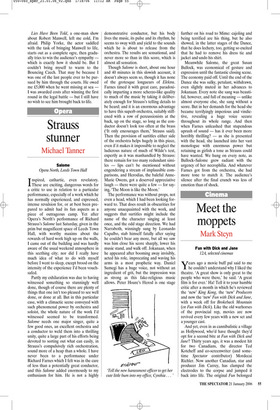Strauss stunner
Michael Tanner
Salome
Opera North, Leeds Town Hall
Inspired, cathartic, even revelatory. These are exciting, dangerous words for a critic to use in relation to a particular performance, especially of a work which he has normally experienced, and expressed, intense revulsion for, or at best been prepared to admit had its fun aspects as a piece of outrageous camp. Yet after Opera’s North’s performance of Richard Strauss’s Salome last Saturday, given in the prim but magnificent space of Leeds Town Hall, with worthy maxims about the rewards of hard work high up on the walls, I came out of the building and was hardly aware of the usual weekend atmosphere in this seething city; nor did I really have much idea of what to do with myself before I went to sleep, except brood on the intensity of the experience I’d been vouchsafed.
Partly my exhilaration was due to having witnessed something so stunningly well done, though of course there are plenty of things that one isn’t too pleased to see well done, or done at all. But in this particular case, with a climactic scene conveyed with such phenomenal power by orchestra and soloist, the whole nature of the work I’d witnessed seemed to be transformed. Salome needs one major singer, quite a few good ones, an excellent orchestra and a conductor to weld them into a thrilling unity, quite a large part of his efforts being devoted to sorting out what can easily, in Strauss’s compulsively rich orchestration, sound more of a heap than a whole. I have never been to a performance under Richard Farnes which I felt was in the care of less than a potentially great conductor, and this Salome added enormously to my enthusiasm for him. He is not a highly demonstrative conductor, but his body lives the music, its pulse and its rhythm, he seems to sway with and yield to the sounds which he is about to release from the orchestra. The results are sensational, and never more so than in this score, which is almost all sensation.
Though Salome is short, about one hour and 40 minutes in this slowish account, it doesn’t always seem so, though it has none of the grotesque longueurs of Elektra. Farnes timed it with great care, paradoxically imparting a more scherzo-like quality to much of the music by taking it deliberately enough for Strauss’s telling details to be heard; and it is an enormous advantage to have this superb orchestra, suitably stiffened with a row of percussionists at the back, up on the stage, so long as the conductor doesn’t look too often at the brass (‘It only encourages them,’ Strauss said). Then the provision of surtitles either side of the orchestra helps hugely in this piece, even if it makes it impossible to neglect the ludicrous nature of much of Wilde’s text, expertly as it was manhandled by Strauss: there remain for too many redundant similes — lips can’t be mentioned without engendering a stream of implausible comparisons, and Herodias, the baleful AnneMarie Owens, got a deserved appreciative laugh — there were quite a few — for saying, ‘The Moon is like the Moon.’ The performance was without props, not even a head, which I had been looking forward to. That does result in obscurities for anyone unacquainted with the work, and suggests that surtitles might include the name of the character singing at least once, and the odd stage direction. We had Narraboth, winningly sung by Leonardo Capalbo, stab himself fatally after saying he couldn’t bear any more, but all we saw was him close his score sharply, lower his music stand, and walk off. Jokanaan, when he appeared after booming away invisibly, acted his role, imprecating and waving his arms in a most prophetic way. Daniel Sumegi has a huge voice, not without an ingredient of grit, but the impression was as strong as this fake-religious music allows. Peter Hoare’s Herod is one stage further on his road to Mime: cajoling and being terrified are his thing, but he also showed, in the latter stages of the Dance, that he does lechery, too, getting so excited that he had to remove his dress tie and jacket and undo his shirt.
Meanwhile Salome, the great Susan Bullock, was economical of gesture and expression until the fantastic closing scene. The economy paid off. Until the end of the Dance she was sulky, petulant, withdrawn, even slightly muted in her advances to Jokanaan. Every note she sang was beautiful, however, and full of meaning — unlike almost everyone else, she sang without a score. But in her demands for the head she became terrifyingly imperious and vindictive, revealing a huge voice secure throughout its whole range. And then when Farnes unleashed that stupendous uprush of sound — has it ever been more horribly thrilling? — as she is presented with the head, she launched into her vast monologue with enormous power but retaining as girlish a tone as Strauss could have wanted. We hung on every note, as Bullock–Salome grew radiant with the urgency of her necrophilia. And whatever Farnes got from the orchestra, she had more tone to match it. The audience’s silence after the final crunch was less of emotion than of shock.



















































 Previous page
Previous page